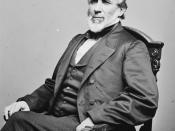As in any novel, the characters of A Solitary Blue by Cynthia Voigt are portrayed by the author as positive, neutral, or negative characters. In this particular book, the characters are excellent subjects to utilize the positive/negative analysis on because the characters in this book are scattered about the positive and negative spectrum. Some of the main characters are portrayed as purely negative; others are represented by the author as genuinely good people or as neutral individuals. However, the characters of a novel, main characters especially, do not always stay negative, positive, or neutral. The characters often shift slightly or even greatly from one status to the next. This is definitely the case in A Solitary Blue. Three of the main characters in particular display this shifting very clearly: Melody, the Professor, and Brother Thomas.
Melody abandoned her only son and her faithful husband with the sparse explanation that she had to help the "...people
everywhere that need me, little boys like you who don't get enough to eat and go to bed hungry every night."(Page 4). Later on, she lied constantly to her son to deceive him into thinking she actually cared about him, and reviled his kind, shy father in the process, blaming him for all the pain Jeff had to suffer. It is apparent that Melody is an overall negative character. However, Melody was not always portrayed as this type of character in the book because the author cloaked much of her true personality from both Jeff and the reader in the beginning of the story. The author manipulated how the reader comprehended the characters greatly by making the reader see things through Jeff's eyes. For example, in the beginning of the story before Jeff went to visit his mother in South Carolina, the author depicts Melody as a neutral character because Jeff views her as neither good nor bad. He simply thinks of her as the woman who abandoned him to do good for the rest of the world, which gave her a balanced reputation in Jeff and the reader's eyes. Later on in the story, Melody's representation shifts from neutral to positive when Jeff visits her in South Carolina. Despite her partial ignorance of Jeff and her tendency to leave Jeff behind going to events or parties, Jeff is spellbound with revived love for his long lost mother, and the reader is as well. Throughout the rest of the book though, Melody progressively declines to a negative character because of her hurtful dishonesty and negligence unraveled upon a young and naive Jeff.
The Professor is perhaps one of the most transmogrifying characters in this novel. Jeff (and as a result the reader) is constantly reconsidering his view of the Professor, sometimes feeling angry at him for causing Melody to leave, other times feeling fortunate to live with someone as wise and kind as the Professor, and yet still other times feeling indifferent. Jeff's initial view of the Professor was mostly indifferent because Jeff had nothing against the Professor, but he didn't appreciate him much either. The Professor gradually evolved to a more negatively portrayed individual as Melody began to turn Jeff against his father, saying that his father was dull and too caught up in his own work to raise a son, as she did on page 61 when she said "Isn't that like him? Just like him, just exactly like him. I thought I could save him, I thought I could wake him up, but I never could. Nobody ever could, that's what I think now." Melody said this to give Jeff the wrong impression of the Professor, deeming him an inexperienced and unfit father. Jeff believed her too, until he finally came to the realization that Melody didn't care about him at all, and that she was spewing lies at Jeff merely to take advantage of him. It was at this point in the story when Jeff and his father began to bond and understand each other better, because they had both been scarred by Melody and her erroneous love. The Professor mentioned this fact on page 160 when he said "I didn't know anybody could hurt anybody else that much; it was like she stuck a sword into me, one of those Japanese samurai swords, do you know the kind I mean? Heavy and razor sharp_ and curved_ and she'd stuck it in me and then she was...pushing it around." Jeff, as well as the reader, began to see the Professor as someone wise yet quiet, as one who possessed a latent capacity for fatherhood because Jeff simply had no one left to love. The author's positive depiction of the Professor continued to develop when Jeff and the Professor moved to Crisfield, as well as throughout the rest of the novel.
Although Brother Thomas is not such an integral part of the story that it would qualify him as a main character, he certainly is an individual often portrayed by the author in many different ways. When Jeff first met Brother Thomas, he regarded him much as he had regarded his father in his early childhood, as an indeterminate being, as someone who is merely an existence, nothing special. Jeff had nothing to really admire about Brother Thomas, but he had nothing against him either. Throughout the course of the novel, however, Jeff's indifferent attitude towards Brother Thomas would change dramatically. Later on in the novel, Jeff acquired ample respect for Brother Thomas and his ways, since Brother Thomas had helped Jeff in his many struggles selflessly. One such time was when Brother Thomas picked Jeff up at the bus station after his first visit with Melody. Brother Thomas was much more caring and inquiring than the Professor would've been, saying on page 74 "...You look taller than I remember, have you grown? And tan too; did you have a good time? ...How was the trip?" After this conversation, Brother Thomas went out of his way to buy Jeff a meal and to further discuss Jeff's travels. This clearly depicts Brother Thomas as "the father Jeff never had", and as someone with great kindness and virtue. The author, in my opinion, purposely tried to portray Brother Thomas as a neutral character at first in order to keep him an unimportant character in the eyes of the reader, who would later emerge to aid the Professor and Jeff in their troubles with money, Melody, and most of all, hope. Towards the end of the novel, Brother Thomas obtained a sage status and represented one who had great faith and benevolence.
The author of A Solitary Blue successfully assigned positive/negative impressions to each character, adding the essential element of human nature into the novel's plot. She was able to change those impressions as well, to keep the reader interested in addition to adding a twist to the characters in the story. The combination of having positive/negative characters and having them shift from positive to negative or vice versa was an essential part in composing this novel, as well as writing any other novel.





